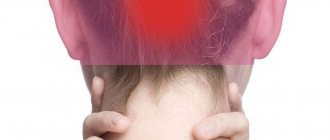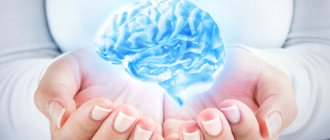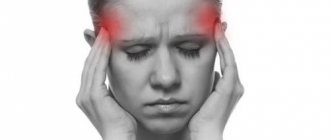About 70% of the population suffer from periodic headaches, and about 7% from constant headaches. In 10% of these patients, symptoms are due to another organic disease.
Headache as a side symptom occurs in many somatic and mental diseases. But it is also a particularly common form of psychosomatic disorder. The position of the head is part of a person’s involuntarily experienced internal state.
Headaches may accompany the following disorders.
- For psychosomatic reactions to acute trauma or acute conflict. Most of us know examples of this from our own experience, such as headaches after exciting or painful experiences.
Brief headaches can replace resentment, hostility and anger. They can act as a reaction to overwork and internal or external overload against the background of a conflict associated with recognizing one’s own importance. Often with tension headaches, there is a triggering situation of the inability to achieve the desired social success.
- Within the framework of personality development disorders. Here we must distinguish between simple anomalies of mental development, in which conflicts are recognized, and anomalies of mental development, in which conflicts are repressed into the unconscious.
An example of a simple developmental anomaly is exhaustion depression according to Kielholz (1971), which appears as a consequence of prolonged emotional stress and occurs, as a rule, in three stages.
At the first, asthenic-hyperesthetic stage, patients are irritable and very sensitive. At the second stage, psychosomatic complaints appear, among which headaches come first.
Only at the third stage, finally, do depressive symptoms appear in the mental sphere and depletion of the adrenergic nervous system in the somatic sphere (typical depressive “headache syndrome of the second half of life”).
An example of anomalies of mental development with conflicts repressed into the unconscious is a neurotic developmental disorder and psychosomatic diseases in the narrow sense. With both forms of unconscious anomalies of mental development, headaches are a very common symptom.
- Headaches in psychopathic individuals occur within dysphoric states and in aggravating situations.
- In conclusion, headaches should be mentioned as psychosomatic symptoms within the framework of endogenous psychoses.
This includes headaches within the schizophrenic circle, primarily symptomatic schizophrenic psychoses, such as senestopathic schizophrenia, in which the most important symptom is often peculiar sensations in the head.
These patients often find it difficult to verbalize their sensations and describe the sensations in the head not as a painful phenomenon itself, but rather as a peculiar feeling that may border on depersonalization.
Finally, headaches are a common psychosomatic symptom in depression. They can, along with other somatic complaints, dominate in such a way that the depression itself is only difficult to recognize. These depressions are therefore often described as hidden or masked.
Personality picture
Tension headaches that occur for neurotic reasons may be caused by external and/or internal work conflict.
This reveals excessive claims and too high expectations of success and recognition.
They lead to disappointment, especially when their elimination is delayed by feelings of guilt emanating from childhood (Bondarenko et al., 1997; Benedittis et al., 1992; Ehdeetal., 1992; Holmetal., 1986; Lehrer, Murphy, 1991).
The personality picture often shows increased ambition with excessive activity and usually a very monotonous life.
The desire for perfection and an increased level of aspirations are also characteristic of such patients. They never experience complete relaxation.
Prolonged tension in the muscles of the shoulder girdle, the back of the head and the entire head is an accompanying manifestation and expression of frustration, internal tension, which never leads to certainty, satisfaction and resolution.
Along with these circumstances, which, due to their relative frequency, are considered typical, there are other psychodynamic factors.
Different age groups, different levels of education, different forms of socialization and, finally, initial personality structures all matter.
Neurotic mechanisms may represent the main factor in the etiology of the syndrome, so that even the detection of an organic lesion does not always lead to the goal. The problem often remains unresolved, which is confirmed, among other things, by difficulties and ambiguous treatment results.
A systematic study of the life circumstances of patients with headaches often makes it possible to establish a connection between attacks of headaches and typical episodes that play out in the patient’s environment.
The psychosomatic approach attempts to give some meaning to the symptom of a headache, regardless of its cause.
So, a headache can mean difficulty thinking. With both chronic headache and migraine, patients predominantly have an above-average level of intelligence.
The imaginary “neurotic dullness” of numerous patients with habitual headaches often appears to be nothing more than the result of difficulty in thinking and a consequence of their intellectual negativism.
Although it is impossible to talk about the cephalgic patient’s own personality type (prolonged severe headaches), patients with headaches often experience anxious manifestations ( Anxious states (from the English anxiety - anxiety) - syndrome. Manifest in the form of a predominance of anxiety, fears, accompanied by vegetative symptoms (palpitations, sweating, tremors)), increased ambition and desire for dominance, a tendency towards perfectionism and, as a result, chronic mental overload.
A high level of aspirations leads to a conflict with real possibilities and fears, suppressed aggressiveness and frustrations, which can be expressed in a background state of chronic tension. Briefly, this can be described as a conflict between the patient’s desire and ability.
Spastic headaches are primarily associated with excessive stress on the muscles in the back of the head, shoulder girdle and head.
The same applies to vasomotor headaches and migraines. But why does a person constantly “put his forehead forward”, “keep his ear to the ground”, “clench his teeth”, “bite his lip”, be “hard-headed”, etc.? Headaches occur due to changes in the vascular apparatus of the head.
Spastic narrowing of the vascular bed correlates with constant tension of the motor system, and both through the autonomic nervous system are closely related to the state of mind. With strong emotions, prolonged mental stress and conflicts, headaches can very easily occur if a person, by his constitution, has a very labile, reactive vascular system.
What is the psychological significance of headaches?
The head, literally and figuratively, is the “highest” part of the body, in which the brain and sensory organs are located.
A patient with headaches is in an ambivalent position. On the one hand, he strives to work seriously and actively with his head, but on the other hand, this very head, due to pain, is a depressing obstacle. An unconscious symbolic reflection of suppressed feelings occurs.
If a person’s head is constantly under pressure (the pressure of activity), then it “should” begin to hurt. In addition, a headache is a way to unload. If, for example, anger or frustration manifests itself in a headache, then the patient and those around him usually find it easier to accept the physical symptoms than the mental ones.
What is psychosomatics and how does it manifest itself: the opinion of a psychologist
One of the main requests with which people often turn to the Moscow Psychological Assistance Service is anxiety and stress. Experts note that it is imperative to work with these negative emotions, since they can have a serious impact on human health. Psychologist Elena Gerasimova talks about what psychological causes cause somatic disorders, what psychosomatics is and how it manifests itself.
In life, we constantly accumulate mental stress, and our body reports that something is wrong with it. This phenomenon is called a “psychosomatic disorder.” Psychosomatics is a branch of medicine and psychology that studies how feelings and experiences affect a person’s physical health.
Psychological reasons that can cause somatic diseases:
- Lack of positive emotions (low mood, anxiety, depression, stress). A person needs positive impressions no less than vitamins.
- Negative destructive thoughts directed at oneself or at other people: “everything is bad.”
- Repeating certain phrases that provoke health problems (for example, the phrase “I can’t see you” can lead to myopia).
- Voluntary “transfer” of the illnesses of someone close to you (identification).
- Exhausting feelings of guilt, self-flagellation.
- Self-hypnosis under the influence of sources that are authoritative in a person’s opinion (information from encyclopedias, the Internet, television).
- Manipulation of a non-existent, fictitious illness (with the help of an illness a person tries to organize the actions and feelings of other people).
When your heart hurts
25-year-old Muscovite Margarita turned to a psychologist. The girl dated a young man, Ivan, for two years. She dreamed of getting married and starting a family. Ivan, on the contrary, was happy with everything. He was in no hurry to formalize the relationship legally, because he believed that there was no need to rush, he needed to live for himself. The girl more than once raised the conversation about marriage and having children, but the young man answered irritably: “Why do we need formalities? We feel so good together! Are you ready to be a mother at all? These baby diapers, screams and all that? You yourself are used to silence, but the child will constantly demand attention. If you want, babysit your niece.” This answer, which was not received for the first time, did not suit the girl, and another scandal broke out between the couple. Accusations of Ivan being frivolous and irresponsible began. But he continued to stand his ground.
The young people decided to separate for a while. Everyone thought about their own. Margarita was very worried, she began to suffer from frequent headaches, insomnia, loss of appetite and heart rhythm disturbances, and her blood pressure periodically increased. My health worsened and I had to see a doctor. The examination did not reveal any pathology. The doctor recommended that she see a psychologist.
“Functional heart rhythm disturbance is a reaction to conflict situations, anxiety, when a person takes everything to heart. There is a connection between fear and heart rate. Blood vessels regulate the autonomic nervous system, which is connected to our emotions and directly interacts with feelings,” notes the psychologist.
Mental stress, conflicts and worries lead to contraction of smooth muscles, changes in the condition of blood vessels and, as a result, increased blood pressure, heart rhythm disturbances, and chest pain. Fear can cause increased heart rate and heart pain, and conversely, pain with an altered heart rate can cause fear. Both processes increase their impact on each other and uncontrollably turn into an attack.
How can you help yourself
At the moment a familiar pain occurs, remember all the details of the situation: what actions you performed, what you looked like, what sensations you felt, what you thought. If you were talking with someone at this time, be sure to remember the words of your interlocutor and your thoughts about them. This will help you analyze and determine what exactly you are reacting to.
The following psychosomatic disorders are distinguished:
- diseases:
- cardiovascular system (hypertension, coronary heart disease are the most dangerous, as they lead to strokes and heart attacks);
- gastrointestinal tract (gastric and duodenal ulcers, ulcerative colitis);
- endocrine (diabetes mellitus, Graves' disease - thyrotoxicosis);
- respiratory system (bronchial asthma);
- skin system (neurodermatitis, scabies on certain parts of the body);
- musculoskeletal system (rheumatoid arthritis, osteochondrosis);
- headaches (tension pain - muscle pain in the neck, back of the head, temples, pressing dull pain, combined with other pain, for example, pain in the legs; pain that covers the “whole head”, paroxysmal, sharp, throbbing, not combined with other pain; pain unilateral, sometimes covering both sides);
- oncological diseases (tumors, neoplasms);
- vegetative neuroses — in the first place are vegetative symptoms (no organic lesions):
- cardioneurosis - extends to the cardiac system;
- hyperventilation syndrome - a pathological condition similar to asthma, without organic damage, spreading to the respiratory system (with all organs intact);
- panic attacks - manifested in a powerful vegetative shift (impaired cardiovascular activity, gastrointestinal tract, feeling of lack of air, increased blood pressure, feeling of fear, anxiety, tremors, etc.);
- hysterical conversion - hysterical symptoms can be manifested in any disease; they arise when a person wants to achieve a certain goal through demonstrations and manipulations.
When a fictional disease becomes reality
27-year-old Victoria, at the insistence of her mother, received a higher education in economics, but did not want to work in her specialty. Her boyfriend offered various employment options, but the girl found any excuses and reasons not to work. She liked a carefree life, and she didn’t want to change anything. The young man was sent on a business trip for a week; he recommended that the girl find a job, as she might have financial difficulties. Having promised to look into this issue, three days later Victoria became bored. She spent most of the money left for groceries on an expensive dress and decided to ask to visit a married friend: “there will always be something to eat there.” Victoria quickly grew tired of the gatherings, since her friend’s four-year-old daughter required constant attention. Vika began to get irritated, because she came to share her problems, but here the child does not allow her to talk calmly! The girl left the house.
When the young man returned, the first thing he did was inquire about Victoria’s progress in finding a job, and was involved in a colorful story about fruitless unsuccessful interviews with a demonstration of a new dress. The young man was angry at the prank, and he gave an ultimatum: either Victoria looks for a job, or they separate. The girl did not expect such a turn of events. What to do?
The next morning, Victoria complained of feeling unwell, citing pain in the heart, weakness, dizziness and nausea. Victoria feigned illness, deciding to stall for time. After a week of continuous “poor health,” the young man took Victoria to the doctor for examination. The results showed complete health. Having confirmed the deception, the man decided to leave. Vika tearfully begged him to save the relationship, claiming that she was “really bad” and needed help. The young man gave her a second chance. After some time, one morning the girl woke up from severe pain in the chest and shortness of breath. She got scared and went into loud hysterics. An ambulance was called. This time Victoria did not pretend, real symptoms appeared. She was sent for treatment to a neurosis clinic with a diagnosis of psychosomatic disorder. After successful treatment, Victoria turned to a psychologist.
Exercises that will help improve your condition:
"Candle"
Imagine that there is a large candle in front of you. You need to take a deep breath and try to blow it out with one exhalation. Repeat. Once again.
Now imagine that you need to blow out five small candles. Take a deep breath and blow them out one by one in small portions of exhalations. Repeat. Once again.
“My illness in the drawing”
Draw and tell it to yourself or someone close to you:
- How did you find out about the disease?
- How did you change when this happened?
- What is the worst thing you imagine about your illness?
- What happens when you recover?
- What does being healthy and strong mean to you?
- How do you see yourself in the future?
«Sun"
Draw a sun with rays and write your positive qualities on these rays. Read them out loud to yourself or someone close to you.
See how many positive qualities you have! There is something to praise and love yourself for. Do this often!
You can learn more about psychosomatics and get answers from a psychologist to your questions from specialists of the Moscow Psychological Assistance Service, both in individual consultations and during webinars. You can sign up for consultations and online classes on the website.
Source
Press service of the Department of Labor and Social Protection of the Population of Moscow
The influence of childhood on the psychosomatics of headaches
Often patients with headaches come from families where intelligence and achievement are highly valued.
Parents were often people themselves, active and could not give their children enough warmth, time and patience, devoting little attention even to their own body and feelings, as well as communication.
Children learn the concept that they live not for themselves, but primarily for their rational activities.
They become increasingly identified with their parents' concept of achievement and become accustomed to outside pressure. Unable to relax or enjoy themselves, they now put their heads under this pressure, choosing goals for themselves that they are unable to achieve.
Relationships with other people are also often based on how beneficial it is for work. In questions about worldview, religion and the future, one constantly has to deal with pessimistic views, which is a consequence of “intellectual negativism.”
Typical concepts for people with headaches are: “I don’t have time,” “work comes first,” “I will do everything myself,” “I don’t do things halfway,” and “you need to think at least a little with your head.”
The secluded life of patients with headaches could be a result of their illness: it is difficult to be pleasant in communication when you are haunted by constant headaches. But the lack of social support may itself be considered a stress factor that can increase the risk of headaches.
Feelings of loneliness and abandonment can be a subtle yet powerful source of headaches in people already biologically predisposed to them.
Lonely people are more likely to get headaches
In any case, headache sufferers should monitor their social lives as well as their physical health, and headache therapists should be aware of the potential influence of social factors.
Stress is a major factor in persistent psychosomatic headaches
There is no doubt that emotional stress, acute or chronic, makes many patients more susceptible to illness."
As for some specific types of stress factors, which are, apparently, the most powerful causative agents of headaches, among them are:
- unsuccessful marriage;
- working with a demanding and harsh boss;
- long-term failures or unhappy family life.
In other words, those stresses that are chronic or overwhelming are the most dangerous.
Also typical for patients with headache are certain personality traits that enhance the perception of unfavorable environmental factors.
Such people have a tendency to do everything not just well, but in the best possible way, high ambitions, conscientiousness, increased emotionality, difficulties in ambiguous situations, a strong need for social approval and altruism, often accompanied by a feeling of guilt due to insufficient altruism.
The result is chronic stress because these people are less able to protect themselves from excessive demands from others, feel too much guilt to avoid onerous tasks, and are more likely to give in than to allow themselves to be drawn into unpleasant confrontations with others.
Or maybe this is a “family” disease?
Very often, when diagnosing arthrosis of the elbow, knee, or hip, many remember that their relatives had similar problems. If someone in the family had a weak heart, sooner or later other family members, in order to be “their own,” will begin to complain of heart ailments. In such cases, psychosomatics is combined with real symptoms, and it is no longer so easy to figure out what actually caused the illness.
30-60% of patients who seek medical attention have unexplained symptoms
What to do if you have a psychosomatic headache?
Treatment of a patient with psychosomatic headaches solely with the help of analgesics is insufficient if the symptoms are based on states of external or internal tension that are inaccessible to the perception of the patient himself. Conflict processing can usually occur in short-term therapy, the effectiveness of which is often enhanced by accompanying psychopharmacological treatment.
Tension headache is an indication for a combination of psychotherapeutic conversations and all types of somatic interventions.
Chronic and fixed personal conditions respond best to group therapy methods (art therapy, psychodrama, body-oriented psychotherapy, gestalt therapy, transactional analysis); if necessary, they are supplemented with short psychotherapeutic conversations.
Patients usually try to occupy a special position in the group, begin to express their personal problems quite quickly, show signs of obsessiveness and narcissistic traits, and turn out to be very touchy.
If therapeutic measures aimed at the somatic sphere, such as intensive kinesiotherapy, functional stress relief, etc., are carried out in parallel, this can facilitate verbal group treatment, as well as group therapy.
In patients who do not want or cannot undergo psychotherapy, the method of self-monitoring of muscle tension using biofeedback is successfully used.
The key to preventing persistent stress headaches is to simply become less susceptible. The more you free yourself from the chronic need for approval from others, the better you will be able to develop, respect and understand yourself.
What is internal conflict and how does it affect our health?
The basis of any psychosomatic illness is internal conflict. For example, the contradiction between “I can”, “I want” and “I must”. If a person does a job he doesn’t like and still earns good money, he is in a state of conflict between “I want” and “I need.” The source of constant tension remains with him constantly, the psyche cannot cope with stress and turns on a defense mechanism - somatization.
The brain channels tension through the autonomic nervous system, which controls the functioning of internal organs. What it will be - osteoarthritis of the knee joint, pyelonephritis or a banal migraine - depends on the human body, its weak points and inclination.
Are you doing something you don't like? Expect health problems
Recommendations for psychosomatics of constant headache:
- Don't be afraid to speak up and express your emotions. This is better than accumulating negative experiences (in the form of indignation and frustration).
- Know your limits. You can't reach the sky, but you shouldn't feel guilty about not having wings. Work to the best of your ability and try to feel satisfied with your work.
- Don't try to please everyone. This will inevitably lead to you deceiving yourself in one way or another.
- Get used to positive thinking. No matter how much it bothers you that you don't have something, remind yourself that you have something else.
- Smile and laugh more often. Research shows that this releases endorphins, natural substances that can improve your mood. Smiling can significantly lift your mood, even if you didn't think about it.
- Cry more often. Many psychologists say that crying is the best way to release stress, second only to a loud, high-pitched scream.
- Get up earlier in the morning. Many headache-prone people find that they can prevent an attack by getting out of bed ten to fifteen minutes earlier. Feeling good all day long is worth a few minutes of lost sleep.
- Since tense muscles, especially in the shoulder and neck areas, are a common cause of headaches, relaxing them can be an effective preventative measure.
For persistent headaches, a combination of biofeedback with muscle relaxation (Blanchard et al., 1987; Blanchard et al., 1990) and cognitive psychotherapy methods (Lisspers, Ost, 1990) have been successfully used.
“Psychosomatics” by I.G. Malkina - Pykh
Read articles on psychosomatics in the “Psychosomatics”
Why does my head hurt?
The block of the 7th chakra, the failure of the Holy Spirit, the Daily Bread, to flow into a person through the head, is pride-selfishness. Like, without God and grace, I can rule this world. You won’t even be able to steer yourself without the grace of God, that’s what illnesses tell us. And we will talk about this below, how to be constantly in the Holy Spirit, without wasting time on worries and false fears.
- Dehydration of the brain. The body signals pain, lack of water in the organ. If you have a headache, dehydration may be the main cause. Drink 2 liters of clean water during the day, watch Emoto Massaru’s films about living and dead water and begin to fill your body with living water, putting feelings of love and gratitude into it.
- Spinal curvature is one of the main causes of headaches. All the people who came to me with this problem, the headache went away as soon as we put the cervical vertebrae in place. At this moment, cerebral circulation normalizes, and spasms in the head go away.
- Categorical - the field near the head shifts to the right or left, and the head begins to hurt. A categorical person looks at the world from his own bell tower; he also has a wrong opinion. But I need to admit to myself that my opinion is correct, and no longer be categorical. Categoricalism is a war with God, it is a rejection of oneself and people, creation as a whole. Let go of your rightness and do not sit on the letter of the law, because you are better off without you than by you.
- The one who destroys everyone around with his head has a headache. In his thoughts he walks around and kills everyone. It’s hard to even stand next to such a person; your head starts to hurt. Stand next to the grandmothers at the entrance and you will understand what I’m talking about.
We will now analyze the mechanism of closing a person from the will of the Divine and the reason for the block of the 7th center.
Blocking of the highest center, the 7th chakra - a person does not understand and does not realize that his health and life in general depend entirely on the Holy Spirit. A person goes into his thinking, imagination, the world of fantasies, the world of mental concepts, instead of directly acquiring the Holy Spirit. Comprehend the world through sensations, not thoughts. Ego, pride, mental fantasies and self-justifications are the program that separates a person from the Spirit of God. Once you throw away all thoughts, ideas, knowledge, and enter into feelings, the door to the world of the Spirit opens. And then, already cultivating in himself humility, meekness, kindness and mercy, a person becomes like God in his original beauty and is deified. While you think and live in thoughts, the Holy Spirit does not come into you; as soon as you begin to directly feel the world, the Spirit immediately opens.
It is very important to understand that the Holy Spirit is always there. The Holy Spirit permeates everything, like the rays of the sun, and only the construction of the Ego, pride, separates a person, along with his body, from God, closing in on himself. We call such people closed, closed, in their own minds, cunning and crafty. The Holy Spirit is true. When lies appear, the light goes away. If you lied, you lost the Holy Spirit. The quality of truthfulness is the basis, the foundation for the Spirit of God.
People who lie are black as coals on the subtle plane; unpleasant energy emanates from them. You probably notice this every day when you interact with people. We intuitively feel who is deceitful and who is truthful and bright. Make a vow to always tell the truth, and the light will not leave you. The light of truth will disperse all the darkness of suffering, illness and suffering. After all, liars always suffer.
But what makes a person lie?
Rejection of his nature, a person sees his innate qualities, his inclinations and habits and tries to hide them by wearing masks of lies. Therefore, in Christianity, the first step to God is the acceptance of one’s sinful nature. You need to tell yourself honestly that I am: proud, arrogant, deceitful, cunning, lustful, greedy, angry, touchy, changeable, unreliable, stubborn, etc. In a word, I don’t smell very good when I lie, because I have a lot of dark, rotten qualities, and people smell them. What people are doing now is trying to hide piles of feces inside themselves.
Christ spoke about this: everyone tries to appear beautiful on the outside, but inside there is an incredible stench, which makes one feel sick.
"27. Woe to you, scribes and Pharisees, hypocrites, for you are like whitewashed tombs, which on the outside seem beautiful, but inside are full of the bones of the dead and all uncleanness;
28. So, outwardly, you seem righteous to people, but inside you are filled with hypocrisy and lawlessness.”
(Matt. 23, 23–28)
And so such a person, with an uncleaned mind, runs to his “friends” to share his stench. Am I not telling the truth? Pay close attention to how you feel after interacting with people throughout the day. Every person has a very beautiful and creative soul that is always looking for a way out to God, she remembers the Holy Spirit, she remembers the grace of the spiritual world from which she came to Earth and knows her eternal nature of bliss. And in every person there is a sinful beginning, from which there is a stench, and which we do not want to accept. But we are obliged to receive the experience of suffering, pain, blood, illness, death of the body, breakup, betrayal, betrayal, sadness and complete hopelessness, as a conscious consciousness, and it is useless to run away from it, in this life you run away from suffering - in the next you will receive it. A million births are nothing to the Universe. But as soon as we accept everything now, jump into pain, look fear and death in the face, kiss them, we become bigger, we begin to see the world through the eyes of Absolute Harmony at every moment of time.
If you are sick now, then you are not accepting something in life. Look, accept this as a fact of the manifestation of the Divine will, and suffering will disappear along with illnesses. If it exists, then God loves it. If there are maniacs and rapists, it means that God loves these sick children. When a mother gives birth to a child with a serious illness, she often loves him more than healthy ones and shows maximum service to him. Maybe God is exactly the same, loves prodigal sons more than healthy children. After all, one soul that repents brings more joy to the world of heaven than a righteous man who is proud of his righteousness. Your mind will perish if you deprive it of nourishment. Intelligence and pride are one and the same. This is selfishness, egoism, they say, I rule this world. Relax, you are not God, and even thoughts are given to you. And it’s not up to you to decide how everything will be, because you cannot make sure that there is no disease, death, old age and suffering on Earth. You can only observe with tenderness that God manifests everything from Himself and looks at everything Himself. This world is God's cinema, where He is the spectator, the screen, the electricity, the director, the actor and the roles, i.e. limitations that we call people. Everything is God, everything is light, and everything is love. As soon as you accept everything that is as a manifestation of God, at that moment the headache will leave you forever and nothing else can hurt your ego, because the ghost of the Ego will dissolve and only God will remain.
Tell yourself and realize:
- Everything is permeated by the Holy Spirit. All the will of God.
- There is no point in worrying and worrying, because God is at the helm.
- I ask the mercy of the Heavenly Father to pour out the Holy Spirit on me, and let this Spirit feed me day and night.
- I realize that I have many dark qualities, and I accept them as a given of my material, limited nature. Instead of fighting my nature, I will engage it in useful work. When a person works, at that moment he is sinless. Even the worst person can use his nature for the benefit of everyone. And even the most righteous person can lie on the couch without bringing benefit to others. There is no sin, and there is no righteousness - these are all conventions. You are who you are. If you are a demon, fulfill your demon dharma, if you are an angel or a saint, fulfill your dharma.
- Inside every demon there is a loving principle, and inside every angel there is a loving principle. Every animal has a loving side, even if it is a predator.
- Look at your nature and don't try to hide it. Just fulfill your dharma. Even demonic people can be very useful if they feel their intuition and the instructions of the teacher. And the righteous, who do not accept the teacher’s instructions, fall into the delusion of pride and begin to condemn the whole world of God and all his creations.
- Everything is Divine, you just need to see it. Don't judge - you won't be judged. You did not create this world, it is not for you to judge it. Take for granted everything that can happen to you. After all, through you, whether you like it or not, a loving principle, God himself, acts, and every moment of your life you are exactly where you need to be, even now, reading this text. God Himself works through you, relax and wave your hand to Him, He is smiling at you now.










